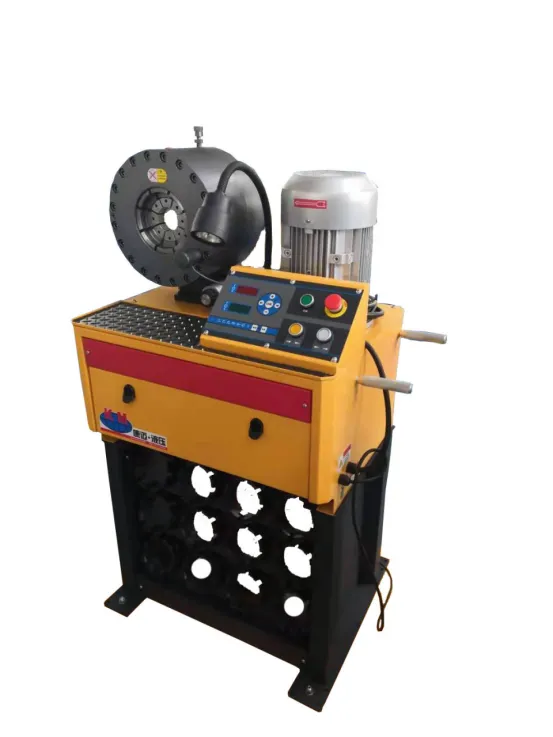335345435
Jun . 23, 2025 15:24 Back to list
Hydraulic Pipe Crimper for Sale: A Wholesaler’s Guide to Sourcing Premium Crimping Solutions
In the competitive landscape of industrial tools, sourcing reliable hydraulic pipe crimper for sale is crucial for wholesalers aiming to meet the demands of hydraulic system installation and maintenance. Whether catering to automotive repair shops, construction fleets, or manufacturing facilities, understanding the nuances of crimping machines can set your inventory apart. Here’s a comprehensive roadmap to smart sourcing—focused on performance, durability, and customer satisfaction.

Pipe Crimper for Sale: Prioritizing Precision and Compatibility
When evaluating pipe crimper for sale, start with the core: precision crimping is essential for leak-free hydraulic connections. Look for crimpers with adjustable dies that match hose and fitting sizes, ensuring a consistent crimp diameter. Hydraulic-powered crimpers offer higher force (up to 100 tons) for heavy-duty applications, while manual or pneumatic models suit smaller workshops.
Case in point: A hydraulic hose crimping machine used in construction must crimp 1/2" to 2" hoses with accuracy within ±0.01". Suppliers who provide die charts and calibration certificates demonstrate transparency. Always verify the machine’s compatibility with popular hose standards (e.g., SAE 100R12, ISO 6803) to avoid costly mismatches.
Hydraulic Hose Crimping Machine for Sale: Key Features for Industrial Use
Industrial clients demand hydraulic hose crimping machine for sale that can withstand rigorous daily use. Focus on these critical features:
Die Set Variety: Ensure the machine comes with a comprehensive die set covering common hose diameters (1/4" to 2") and fitting types (NPT, JIC, ORFS). Optional die sets for specialty fittings can expand your market reach.
Digital Display: Models with LCD screens showing crimp pressure, diameter, and cycle count enhance precision and allow for easy troubleshooting. Look for machines with memory functions to save frequent crimp settings.
Safety Features: Prioritize crimpers with emergency stop buttons, safety guards, and automatic pressure relief valves. These features comply with OSHA standards and reduce liability for both you and your clients.
Hydraulic Hose Machine for Sale: Balancing Power and Portability
Sourcing hydraulic hose machine for sale requires balancing power with practicality for different work environments:
Stationary vs. Portable: Fixed-base crimpers offer maximum stability for high-volume shops, while portable models (e.g., hand-held or cart-mounted) are ideal for on-site repairs. Stock both to serve mobile mechanics and industrial workshops.
Energy Efficiency: Electric-hydraulic crimpers consume less power than diesel-driven ones, making them preferable for eco-conscious clients. Look for machines with low-idle power modes to reduce operational costs.
Maintenance Accessibility: Choose machines with easy-to-reach hydraulic filters and service ports. Suppliers who provide detailed maintenance manuals and online tutorials simplify after-sales support.
Hose Crimping Machine for Sale: Strategic Sourcing for Profitability
Partnering with manufacturers who offer hose crimping machine for sale requires a focus on quality and cost-efficiency. Here’s how to gain a competitive edge:
Vertical Integration: Work with suppliers like Dayi Rubber Products Co., Ltd., which integrate in-house manufacturing with advanced testing (e.g., computer-controlled crimp verification systems). This ensures consistent quality and faster delivery on bulk orders.
Training and Support: Seek suppliers who provide operator training and technical support. Bundling machines with training sessions can justify premium pricing and attract clients new to crimping technology.
Warranty and Service Plans: Machines with 1–2 year warranties (covering parts and labor) build trust. Offering extended service plans can create recurring revenue streams for your business.
FAQ: Demystifying Hydraulic Crimping Machine Queries
How do I choose the right die set for a hydraulic hose crimper?
The die set must match the hose’s outer diameter and fitting type. Consult the manufacturer’s die chart—for example, a 3/8" SAE 100R2 hose requires a specific die to achieve the correct crimp diameter (typically 0.75" to 0.78").
Can a hydraulic hose crimping machine be used for other materials?
No, unless specifically designed for multi-material use. Using crimpers on non-hydraulic materials (e.g., plastic pipes) can damage dies and compromise crimp quality. Always verify material compatibility with the supplier.
How often should a crimping machine be calibrated?
At least quarterly, or after every 500–1000 crimps for heavy use. Calibration ensures crimp diameter accuracy—use a go/no-go gauge to test crimped fittings regularly. Suppliers like Dayi offer calibration services to simplify this process.
What’s the learning curve for operating a hydraulic pipe crimper?
Basic models take 1–2 hours to master, while advanced digital machines may require 4–6 hours of training. Look for suppliers who provide video tutorials or on-site workshops to support your clients’ operators.
How do I maintain a hose crimping machine for longevity?
Regularly check hydraulic fluid levels, clean die surfaces, and lubricate moving parts. Store the machine in a dry environment, and protect dies from impact or corrosion. Following the supplier’s maintenance schedule can extend machine life by 50%.
Elevate Your Wholesale Business: From Tool to Solution
As a wholesaler, your role is to provide not just tools, but solutions that empower your clients’ businesses. By focusing on precision, compatibility, and after-sales support in your hydraulic pipe crimper for sale strategy, you’ll build a reputation as a trusted partner in the hydraulic industry. Remember: a quality crimping machine isn’t just a tool—it’s the foundation of reliable hydraulic systems that keep industries moving.
Ready to transform your inventory? Collaborate with manufacturers who blend technical innovation (patented die designs, digital control systems) with certification rigor (ISO 9001-compliant production). Your customers will value the reliability—and your business will thrive on the strength of high-quality, supported products.
-
LPG Hose: Choosing the Right Hose for Safe, Reliable Gas Transfer
NewsAug.07,2025
-
Industrial Hose: Types, Applications, and Where to Find Reliable Suppliers
NewsAug.07,2025
-
Hydraulic Hose Pipe: Types, Pricing, and How to Source the Right One
NewsAug.07,2025
-
Hydraulic Fittings: Types, Customization, and Where to Source Them
NewsAug.07,2025
-
High Pressure Washer Hoses: Buying Guide, Specs, and Supplier Insights
NewsAug.07,2025
-
Choosing the Right Gasoline Hose: Flexibility, Resistance, and Supply Options
NewsAug.07,2025



